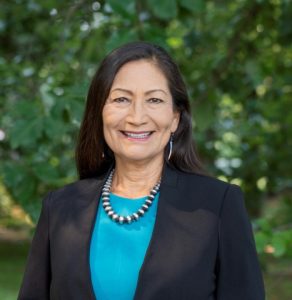Native American Heritage Month Spotlight on Secretary of Interior, Deb Haaland

Secretary Deb Haaland made history when she became the first Native American to serve as a cabinet secretary. She is a member of the Pueblo of Laguna and a 35th generation New Mexican.
Secretary Haaland grew up in a military family; her father was a 30-year combat Marine who was awarded the Silver Star Medal for saving six lives in Vietnam, and her mother is a Navy veteran who served as a federal employee for 25 years at the Bureau of Indian Affairs. As a military child, she attended 13 public schools before graduating from Highland High School in Albuquerque.
As a single mother, Secretary Haaland volunteered at her child’s pre-school to afford early childhood education. Like many parents, she had to rely on food stamps at times as a single parent, lived paycheck-to-paycheck, and struggled to put herself through college. At the age of 28, Haaland enrolled at the University of New Mexico (UNM) where she earned a Bachelor’s degree in English and later earned her J.D. from UNM Law School. Secretary Haaland and her child, who also graduated from the University of New Mexico, are still paying off student loans.
Secretary Haaland ran her own small business producing and canning Pueblo Salsa, served as a tribal administrator at San Felipe Pueblo, and became the first woman elected to the Laguna Development Corporation Board of Directors, overseeing business operations of the second largest tribal gaming enterprise in New Mexico. She successfully advocated for the Laguna Development Corporation to create policies and commitments to environmentally friendly business practices.
Throughout her career in public service, Secretary Haaland has broken barriers and opened the doors of opportunity for future generations.
After running for New Mexico Lieutenant Governor in 2014, Secretary Haaland became the first Native American woman to be elected to lead a State Party. She is one of the first Native American women to serve in Congress. In Congress, she focused on environmental justice, climate change, missing and murdered indigenous women, and family-friendly policies
